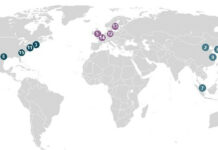 There’s been a lot of discussion recently on the subject of Net Neutrality. The debate centers on whether to split the Internet superhighway into fast and slow lanes, creating a mega-gigabit HOV lane for corporate giants and a traffic-clogged access road for the rest of us.
There’s been a lot of discussion recently on the subject of Net Neutrality. The debate centers on whether to split the Internet superhighway into fast and slow lanes, creating a mega-gigabit HOV lane for corporate giants and a traffic-clogged access road for the rest of us.
Last month, President Obama came down firmly on the side of Net Neutrality, declaring the Internet should be treated like a public utility with equal access and service for all. The FCC, appointed by the president, is expected to follow suit and direct service providers to adhere to broadband equal rights.
But there hasn’t been much commentary about a significantly more ominous subdivision of the Web into two geopolitical “spheres of interest”: one that respects human rights and one that advances the economic interests of dictatorships while they suppress free speech.
The totalitarian government of the People’s Republic of China recently designated one of its politburo hacks, a former minister of propaganda, to serve as the most populous nation’s new Internet Czar. The PRC’s first digital potentate (they call him the “Web Regulator”), Lu Wei, visited California last week to tour Silicon Valley’s tech giants. If you want to know whether he got a warm welcome, just check out the photo that was posted on the state-run China Network agency.
Mr. Lu is sitting at Mark Zuckerberg’s desk while the Facebook founder stands next to him with a fawning smile planted on his face. China’s Web Regulator is admiring a copy of a book entitled Xi Jinping: The Governance of China–an anthology of the Chinese president’s speeches–which Mark has strategically placed on his desk. The book’s cover features a painted image of a bust of Mr. Xi’s head, made to look like the iconic visage of Mao that still hangs over Tiananmen Square, where thousands of youthful protesters calling for democracy were run over by tanks and shot by the People’s Liberation Army in 1989.
According to a report in The New York Times, Zuckerberg said he bought Mr. Xi’s book for himself and co-workers so they “understood socialism with Chinese characteristics.” Memo to Mr. Z: calling China’s ruthless dictatorship “socialism with Chinese characteristics” is like calling the Mafia “law enforcement with Sicilian characteristics.” [Maybe that explains why Facebook’s evolving privacy policies always seemed to be modeled on something you would expect in China].
Mark’s favorite new book includes a speech by Xi Jinping in which China’s president says Beijing should “use Internet communication rules to advocate things wholesome and positive, and disseminate and put into practice the core socialist values…properly [handling] timing, extent and efficiency to make our cyberspace wholesome and clean.”
“It’s a long-term task to ensure that online public opinion is healthy and sound,” China’s paramount leader concludes.
Before you order that Mao-collared T-shirt for your upcoming visit to China, Mark, you might want to note the reference to “our cyberspace” by the Chinese president. To put Mr. Xi’s message in Facebook parlance, he’s saying people in China can only post stuff he approves, whether they like or don’t like it. [Editor’s Note: most of the people in China are blocked from using Facebook by the government, which has approved a Chinese ripoff of Facebook called Renren that censors posts deemed “unhealthy.”]
After enduring a brief lecture from U.S. security officials in Washington about the need to–pretty please, don’t take offense and stop buying our Treasury bonds–end Chinese hack attacks on the U.S., Mr. Lu was welcomed with open arms in the heart of the Geek Universe on the Left Coast. Among those tripping over themselves to toast the PRC’s new Web Regulator with Napa Valley chardonnay were Amazon’s Jeff Bezos and Apple chief Timothy Cook.
In the heady days of the tech boom at the turn of the century, the emerging Internet giants rushed into China to get a foothold in what everyone knew would become the world’s largest market of Web users. Google, Yahoo, Amazon, eBay et al quickly discovered that China plays by a different set of rules: their base code was copied (read stolen) and used to set up competing state-supported Web startups inside China; worse, some of them (Yahoo was by far the worst offender) were persuaded to give China’s security apparatus access to their databases, assisting the PRC’s secret police in rounding up dissidents. [In a Twitter post reacting to Mark Zuckerberg’s embrace of Lu Wei, activist Hu Jia warned that Facebook is “risking repeating the mistakes of Yahoo.” A dissident Chinese journalist whose identify was revealed by Yahoo to China’s security thugs in 2004 was imprisoned for eight years.]
A few of the major U.S. tech players took a principled stand against China’s suppression of free speech, deciding they didn’t want to do business with a government that tramples human rights and makes business piracy a core growth tactic. In 2010, Google pulled its servers from the mainland and put them behind a firewall in Hong Kong to avoid direct collusion with China’s censors and protect its algorithms from code-snatchers.
Fast-forward to 2014: there are now an estimated 680 million Internet users in China. China’s copycat Web startups–especially Alibaba, which deploys a hybrid of Amazon, Google and eBay’s business models–have joined the ranks of the most powerful and prosperous players in the industry (Alibaba’s recent Initial Public Offering on the NY Stock Exchange raised $22 billion, the largest IPO to date). Meanwhile, the People’s Liberation Army has an entire division housed in a windowless building in Shanghai working 24/7 waging cyberwar against the U.S., stealing our industrial and military secrets.
We’re not surprised to see Silicon Valley’s top execs bowing before China’s new Web Regulator; their opposition to China’s onerous conditions for access to its huge market has been evaporating much faster than the ice in Glacier National Park. This year, LinkedIn reportedly volunteered to self-censor some of the content on its Chinese site; Apple has agreed to host some of its data within China, which will make it easier for the PRC’s secret police to hack and read.
Let’s pause here to remember what Vladimir Lenin, the Communist revolutionary who took over Russia in 1918, famously said about the capitalist free-enterprise system: “They’ll sell us the rope we hang them with.”
Those engaged in facilitating this depressing trend say it’s inevitable, that they can’t ignore the world’s largest Internet market. They also hold out the perennial hope that by engaging with China we can get them to adjust their business and social practices to something closer to ours; in other words, bringing the PRC into the world’s interconnected system of eCommerce and communication ultimately will force them to play by the rest of the world’s rules.
Unfortunately, the opposite seems to be happening on the Internet: the rest of the world appears to be moving in the direction of China’s rules. Turkey’s first freely elected president, for example, has made Internet censorship a top priority; other ostensibly democratic nations also are toying with restrictions that stifle whatever offends them on the Web.
Left unchallenged, this sinister trend won’t produce something as benign as a two-lane Internet with different download speeds. It’ll result in a digital superhighway that permits a growing number of countries to put up secret “toll booths” where people who exercise their inalienable human rights are harassed and ordered to get off at the next exit–or worse.

















![[VIDEO] Get More for Your Business in Ardmore. Oklahoma](https://businessfacilities.com/wp-content/uploads/2024/02/maxresdefault-324x160.jpg)
